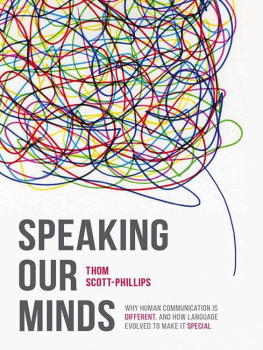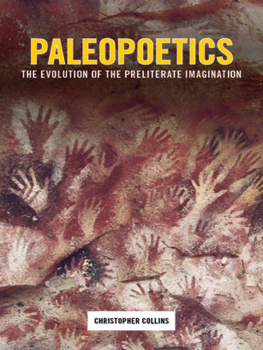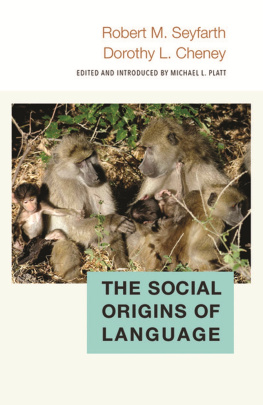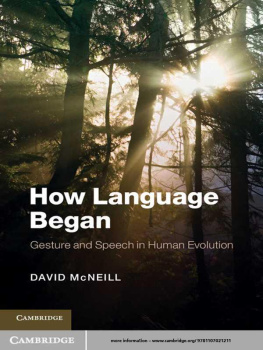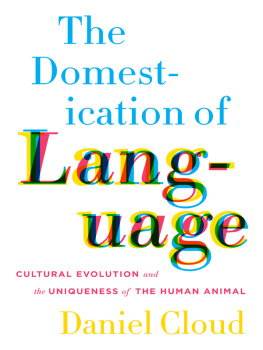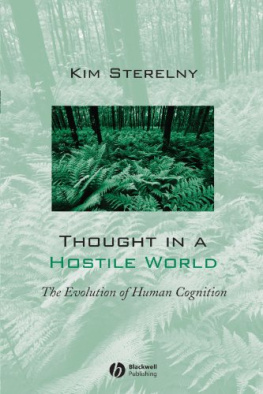SPEAKING OUR MINDS
Speaking Our Minds
Why human communication is different, and how language evolved to make it special
Thomas C. Scott-Phillips


Thomas C. Scott-Phillips 2015
All rights reserved. No reproduction, copy or transmission of this
publication may be made without written permission.
No portion of this publication may be reproduced, copied or transmitted save with written permission or in accordance with the provisions of the Copyright, Designs and Patents Act 1988, or under the terms of any licence permitting limited copying issued by the Copyright Licensing Agency, Saffron House, 610 Kirby Street, London EC1N 8TS.
Any person who does any unauthorized act in relation to this publication may be liable to criminal prosecution and civil claims for damages.
The author has asserted his right to be identified as the author of this work in accordance with the Copyright, Designs and Patents Act 1988.
First published 2015 by
PALGRAVE MACMILLAN
Palgrave Macmillan in the UK is an imprint of Macmillan Publishers Limited, registered in England, company number 785998, of Houndmills, Basingstoke, Hampshire RG21 6XS.
Palgrave Macmillan in the US is a division of St Martins Press LLC, 175 Fifth Avenue, New York, NY 10010.
Palgrave Macmillan is the global academic imprint of the above companies and has companies and representatives throughout the world.
Palgrave and Macmillan are registered trademarks in the United States, the United Kingdom, Europe and other countries
ISBN: 9781137334572 hardback
ISBN: 9781137334565 paperback
This book is printed on paper suitable for recycling and made from fully managed and sustained forest sources. Logging, pulping and manufacturing processes are expected to conform to the environmental regulations of the country of origin.
A catalogue record for this book is available from the British Library.
A catalog record for this book is available from the Library of Congress.
Printed in China
For my parents
Contents
Figures and Tables
Figures
Tables
Acknowledgements
I could of course not have written this book without the help of a great many people. I owe a particularly large intellectual debt to Dan Sperber and Deirdre Wilson, whose Relevance Theory provides a compelling paradigm for the study of human communication. I have also drawn heavily on Sperbers subsequent work on the evolution of communication. With the possible exception of Michael Tomasello, Sperber has more than anyone else to date been at pains to emphasize the importance of pragmatics for the origins of human communication and language, a point that I reiterate a number of times in this book. He also provided very valuable comments on an earlier draft of this work.
I was fortunate enough to, in 2009, spend some months in Tomasellos department at the Max Planck Institute for Evolutionary Anthropology in Leipzig. My time there, not only working with Tomasello but also interacting with the other members of his department, was critical for the development of the ideas in this book. Tomasellos influence is especially apparent through his many outstanding experimental studies on the communication and social cognition of human children and the non-human great apes.
My own intellectual development owes a great deal to my two former PhD supervisors, Jim Hurford and Simon Kirby, who introduced me to this topic, and mentored me through my early explorations. I have since learnt from many others too, but I would like to single out the effect that working with Stu West has had on my thinking and my writing, both of which are much sharper than they would otherwise have been.
I would also particularly like to thank Rachael Bailes, Max Burton-Chellew, Tom Dickins, Richard Moore, Cathleen OGrady, and Andrew Smith, for the more than generous portions of their time they gave to comment on earlier drafts and discuss with me various aspects of this project in detail, and also Martin Edwardes, for his outstanding EAORC service, which keeps me abreast of new developments (look it up if you dont already know about it!). In addition I would like to thank Nicholas Allott, Jean-Baptiste Andr, Rob Barton, Nicolas Baumard, Tanya Behne, Richard Blythe, Holly Branigan, Erin Brown, Greg Bryant, Robyn Carston, Erica Cartmill, Coralie Chevallier, Nicolas Claidire, Hannah Cornish, Gergely Csibra, Robin Dunbar, Claire el Mouden, Julia Fischer, Jacob Foster, Andy Gardner, Alan Grafen, Gerlind Grosse, Dave Hawkey, Christophe Heintz, Stefan Hoefler, Keith Jensen, Michael Lachmann, Bob Ladd, Heidi Lyn, Olivier Mascaro, Hugo Mercier, Olivier Morin, Daniel Nettle, Harriet Over, Martin Pickering, Drew Rendall, Graham Ritchie, Gareth Roberts, Sean Roberts, Barbora Skarabela, Katie Slocombe, Kenny Smith, Szabolcs Szmad, Monica Tamariz, Jamie Tehrani, Carrie Theisen-White, Daniel Wedgwood, and James Winters, all of whom have, at different times and in different ways, helped me develop the ideas in this book.
Finally, I would like to thank my parents, for their love and support, and Tamsin Saxton, who has provided me with both personal and professional support in far greater quantities than anybody has any right to expect.
Publishers acknowledgements
The publisher and author would like to thank the organizations and people listed below for permission to reproduce material from their publications:
is reprinted from GET FUZZY 2009 Darby Conley. Used by permission of UNIVERSAL UCLICK for UFS. All rights reserved.
is reprinted from Animal Behaviour, 79(1), Scott-Phillips, T., Animal communication: Insights from linguistic pragmatics, e1e4, 2010, with permission from Elsevier.
is reprinted from Cognitive Science, 31(6), Garrod, S., Fay, N., Lee, J., Oberlander, J., & MacLeod, T., Foundations of representation: Where might graphical symbol systems come from?, 961987, 2007, with permission from John Wiley and Sons, copyright 2007 Cognitive Science Society, Inc.
Preface
This book is about the origins and evolution of human communication and language. This topic has at different times engaged a highly eclectic set of intellectuals including, to pick just the highest-profile examples, Jean-Jacques Rousseau, Charles Darwin, and Noam Chomsky. It is telling that each member of even this very short list is principally associated with a different academic discipline: philosophy, biology, and linguistics, respectively. A longer list of individuals would likely entail a longer list of traditional disciplines because how and why humans, and only humans, came to have language are questions that span and are relevant to a heterogeneous collection of disciplines. In addition to the above three, it is also an important topic for anthropology, cognitive science, and primatology, among others. This broad relevance reflects the central role that language and communication play in human life.
This multidisciplinarity can be an obstacle to productive research. Contemporary academia is highly partitioned: each discipline and subdiscipline has its own specialized, often highly-concentrated body of knowledge, its own set of established problems, its own methods and methodological assumptions, and its own doyens and factions, many of which have deep sociological and historical roots. Such circumstances discourage attempts to relate the explanatory frameworks of one discipline to those of another. Instead, researchers are encouraged (sometimes explicitly, and sometimes more implicitly, by the way the profession is structured) to identify a particular niche in which they can become expert. The effect is that these niches become insulated from one another. Fields of specialist understanding develop, but bridges between those fields are left to decay, if they ever existed at all.
Next page
